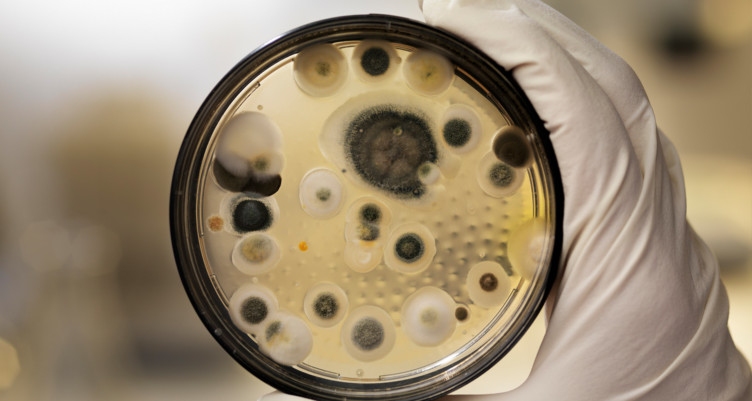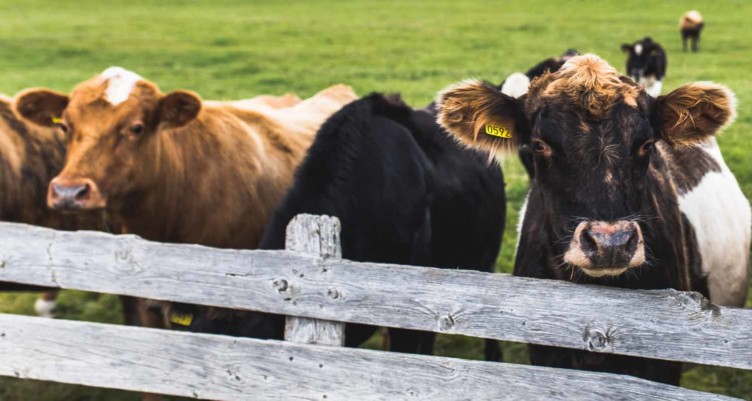Reasons Grass Fed Beef is Better Than Conventional Beef
You may have noticed that the Bulletproof Diet emphasizes high-quality, grass-fed meats and grass-fed butter. Does it really matter what cows eat? Science says yes — it matters for your health, for the ecosystem where the animals are raised, and for the planet as a whole. Here are four major reasons grass-fed beef is better for you (and the cows) than factory farmed beef is.
Four reasons why grass-fed beef is better than conventionally farmed beef
Factory farms are a filthy breeding ground for bacteria
 Feedlots are nasty. Cows are packed in like sardines, with just enough room to eat. Cow life doesn’t come with bathroom breaks, so they have to relieve themselves right where they’re standing. There are drains, but to say that the filth gets cleaned away wouldn’t be accurate at all. It’s common that cows will wade in a foot or more of their own excrement (and their neighbors’).
Feedlots are nasty. Cows are packed in like sardines, with just enough room to eat. Cow life doesn’t come with bathroom breaks, so they have to relieve themselves right where they’re standing. There are drains, but to say that the filth gets cleaned away wouldn’t be accurate at all. It’s common that cows will wade in a foot or more of their own excrement (and their neighbors’).
Grass-fed cows can walk away after pooping. They’re not subject to the level of filth and germs that conventionally-raised cows are.
Organic, grass-fed beef isn’t pumped full of antibiotics
 The disgusting conditions of conventional farming will make animals sick and die, right? Losing animals cuts into profit. Keeping sanitary conditions also cuts into profit.
The disgusting conditions of conventional farming will make animals sick and die, right? Losing animals cuts into profit. Keeping sanitary conditions also cuts into profit.
The cheap solution is to routinely give cows broad-spectrum antibiotics so that they stay alive long enough to grow to full size. Around 80% of antibiotics produced in the United States gets fed to farm animals.
What happens when you use the same antibiotics over and over? Pathogens become resistant to that particular antibiotic. Because the animals eliminate a large portion of the antibiotics unchanged through waste, fully active antibiotics make their way back into soil and water systems. This contributes to antibiotic-resistant diseases not just in cows, but in humans.[1]
Since grass-fed animals require pasture and space, they’re not exposed to the germs that factory farmed cows are exposed to. So, they don’t need continual doses of preventive antibiotics.
Grass fed beef builds soil, while conventionally raised beef destroys soil
 Since antibiotics find their way back into soil, the beneficial bacteria and organisms that build up healthy soil die off. You end up with soil that can’t grow anything and is likely to erode when it rains.
Since antibiotics find their way back into soil, the beneficial bacteria and organisms that build up healthy soil die off. You end up with soil that can’t grow anything and is likely to erode when it rains.
Grass-fed animals make poop that provides nutrients for plants, along with beneficial bacteria for the soil microbiome. The result? A balanced ecosystem of healthy, fertile soil, healthy plants, and land that doesn’t erode at the slightest signs of weather.
Cody Hopkins, a physicist turned founder of the Grassroots Farmers Cooperative, explains on an episode of Bulletproof Radio (iTunes) that he confirmed this with his own testing.
“One thing we’ve done recently is we took a soil sample about four years ago and did it again in one particular field. We’ve seen organic matter go up from 2.7% to almost 4% organic matter. When you make that kind of increase in the organic matter in the soil, that increases that soil’s water holding capacity by 20,000-30,000 gallons per acre,” he explains.
Grass fed beef is more nutritious
 Researchers found that grass-fed beef have a healthier balance of fatty acids than grain-fed meats have. Grass-fed and grass-finished, meaning, the animal was fed grass for their entire lifespan, produced meat with higher levels of omega 3s and higher levels of conjugated linoleic acid (CLA) than grain-fed beef.[2]
Researchers found that grass-fed beef have a healthier balance of fatty acids than grain-fed meats have. Grass-fed and grass-finished, meaning, the animal was fed grass for their entire lifespan, produced meat with higher levels of omega 3s and higher levels of conjugated linoleic acid (CLA) than grain-fed beef.[2]
Grass-fed meat also has a higher level of carotenoids, which makes the fat appear yellow. More carotenoids means more antioxidants and nutrients, and bonus: more flavor.[3]
Bonus reason: grass fed beef tastes better
 If you taste grass-fed beef alongside conventionally-raised beef, you’ll notice a difference. Factory beef doesn’t have the flavor complexity that high-quality grass-fed beef has.
If you taste grass-fed beef alongside conventionally-raised beef, you’ll notice a difference. Factory beef doesn’t have the flavor complexity that high-quality grass-fed beef has.
Hopkins made an observation that different regions produce different flavors in the beef raised there. “We had steaks from grass-fed farmers in North Carolina, we had one from our farm, and then we had one from that Kansas farmer. Each one had a totally different flavor profile. They were all delicious, but they all were very different in their flavors,” says Hopkins.
If you haven’t made the switch, start now. Grass-fed beef is an all-around better experience for your taste buds, for the cows, and for your body.



